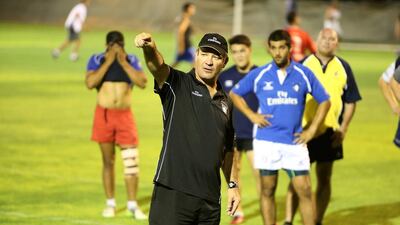DUBAI // Any players who expect to be selected for the national sevens side on birthright rather than merit could be in for a rude awakening this weekend, according to Roelof Kotze, the UAE performance manager.
The squad for the opening leg of the Asian Sevens Series in China will be announced after a training day at The Sevens, Dubai on Friday.
For the first time in more than two years, the abridged format side will be bolstered by expatriate players, complementing the leading Emiratis.
Experienced expats had always provided the backbone of the representative side until 2013, when the UAE Rugby Federation (UAERF) opted to make it only open to passport holders.
That move was designed to help construct a side capable of playing at the 2014 Asian Games. It adhered to Olympic eligibility rules, rather than World Rugby ones which allow players to represent adopted nations after three years of residency.
Read more:
– Roelof Kotze expects UAE Under-20 sevens side to be tested on Asian tour
– A missed opportunity but Asian Championship proved UAE rugby has ‘turned the tide’
However, with the dream of Olympic qualification now out of reach, the UAERF opted to return to the former selection plan, with expats helping less-experienced players.
For all its obvious benefits in terms of development, Kotze had been concerned the Emirati-only policy might have bred a feeling of entitlement among some players.
He hopes the increased pool of talent will remind all players of the need to work hard to achieve selection.
“There are still some who perhaps don’t think they have to work that hard, but we will see this weekend when the squad is announced that for some it will be a wake up,” Kotze said.
“Hopefully that will have a big effect on the next tournament. Guys who have tended to pitch up a week before (expecting to be selected), now we can say, ‘Thanks for coming, you can go home now.’
“That is already happening with the guys that were there. They are training harder because they realise there are guys that can take their place.
“Now there is a lot of competition in training. The guys are working hard because they want to keep their spots.”
Even with the expanded player pool, the UAE face a tough test in the opening tournament of the three-leg series. They face Hong Kong and the Philippines on the opening day of the competition in China, meaning the route to a top-eight finish – the national team’s goal – will be difficult.
“It is going to be tough, but we will do our best and hopefully come away with some results,” Kotze said.
“Our approach has been, if you want to give it a go, come and have a run. If you are good enough, we will pick you.”
Emirati players will have more guaranteed opportunities at club level this season, with the Shaheen development side set to play XVs rugby for the first time in a new third-tier competition.
“Playing rugby for the whole season will be good experience for them,” said Mohammed Shaker, a UAERF board member.
“We are here to make sure everyone in the whole country can enjoy rugby. That is the main objective of the new Community League.”
pradley@thenational.ae
Follow us on Twitter at NatSportUAE


